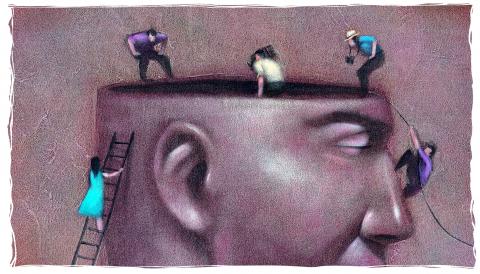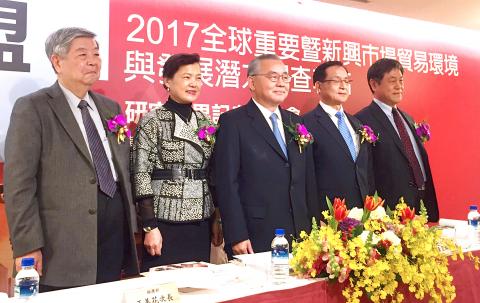Taiwan’s trade competitiveness has fallen for four consecutive years, according to the Importers and Exporters Association of Taipei 2017 Survey on Global Trade Environments and Growth Potential in Key and Emerging Markets, published today.
Out of the 54 countries surveyed, Taiwan is still in the “A list” of “highly recommended” countries in which to trade, although this year Taiwan has fallen to the bottom of the grouping. According to a report by the association, there are three key reasons for the decline: the competitiveness of emerging markets, Taiwan’s low salary environment — which has lead to a talent gap — and an over reliance on the Chinese market.
Taiwan has slipped in all of the survey’s rankings. It is now ranked 13th for competitiveness, while the US pushed Singapore out of last year’s position at the top. Singapore and Germany took second and third place, respectively. On trade liberalization, Taiwan was ranked 18th, with the US, Singapore and the Netherlands taking the top three spots. Taiwan is now ranked 20th for trade convenience and speed, with Singapore, the US and Germany taking first, second and third place.

Graphic: TT
According to the report, the UK’s Oxford Economics forecasts that by 2021 Taiwan will have the most acute brain drain headache of any country in the world.
This article was first published on Feb. 22.
(CNA, translated by Edward Jones)

Photo: CNA
照片:中央社
台灣貿易競爭力連四年下滑。台北進出口公會今發布二0一七年全球重要暨新興市場貿易環境與發展潛力調查報告。
報告指出,台灣雖然位居五十四個貿易地區的A級「極力推薦」區,不過已經是這個等級的最後一名,而導致衰退的三大主因分別為:新興市場競爭力、長期低薪環境人才斷層以及貿易高度依賴中國。
台灣排名全數下滑:國家競爭力排名第十三,美國擠下去年第一名新加坡奪冠,新加坡及德國分居二、三名;貿易自由度台灣排名第十八,前三名為美國、新加坡及荷蘭;貿易便捷度,台灣排名第二十名,前三名為新加坡、美國及德國。
報告指出,根據英國牛津經濟研院發表國際人才報告指出,二0二一年台灣將是全球人才流失最嚴重的國家。(中央社/本文已於二月二十二日刊登)

The human body was not built for spaceflight, with its microgravity conditions, exposure to high-energy radiation and other issues. As a result, trekking beyond the Earth’s confines causes many physiological changes that affect an astronaut’s health. The issue gained new currency with the March mission to return astronauts Butch Wilmore and Suni Williams to Earth after they were stranded on the International Space Station (ISS) for nine months. WHY IS SPACE TRAVEL TOUGH ON THE HUMAN BODY? The human body evolved over millions of years to function optimally in Earth’s environment, which includes its gravity, atmospheric composition and relatively low levels of

A: Yet another shopping mall has just opened in Taipei. B: Do you mean the Mitsui Shopping Park LaLaport Nangang? A: Yeah, the shopping mall run by Japanese Mitsui & Co. opened last week. B: I hear the mall features about 300 stores, Vieshow Cinemas and Japanese Lopia supermarket. A: With the opening, a war is breaking out between Taipei’s department stores. A: 台北又有新的購物商場可逛啦。 B: 你是說Mitsui Shopping Park LaLaport 南港? A: 對啊這家日本三井集團旗下的商場上週開幕。 B: 聽說商場有威秀影城、樂比亞日系超市,還有多達300家專櫃。 A: 新商場一開幕,看來又要掀起一場百貨大戰啦! (By Eddy Chang, Taipei Times/台北時報張迪)

Indonesia is undertaking an ambitious project to relocate its capital from Jakarta to Nusantara, a new city in the province of East Kalimantan. This bold endeavor aims to address the severe environmental challenges and urban congestion plaguing Jakarta. The current capital city struggles with acute air pollution, frequent flooding, and rapid land subsidence. Experts predict that by 2050, a third of Jakarta could be submerged. The primary causes include excessive groundwater extraction and rising sea levels attributed to climate change. Moreover, with a population of over 10 million, it’s very much the economic center of the country. Unfortunately, this

A: Hey, didn’t you go to the opening of the Mitsui Shopping Park LaLaport Nangang last week? B: Yeah, there are about 300 shops, including the first overseas branch of Japan’s Mahou Dokoro — a famous Harry Potter-themed store. A: Wow, I’ve always wanted to get a magic wand. B: There are also a bunch of great restaurants, such as Smart Fish hotpot restaurant. A: I wish I had Harry Potter’s “apparition” and “disapparition” magic, so I could teleport to the mall right now. A: 你上週不是有去LaLaport南港的盛大開幕嗎?有什麼特別的? B: 那裡有多達300家專櫃,包括魔法之地的海外首店——它可是日本知名的《哈利波特》專賣店。 A: 哇我一直想買根魔杖。 B: 另外還有各式各樣的美食,像是林聰明沙鍋魚頭。 A: 真希望我也有哈利波特的「現影術/消影術」魔法,能瞬間移動到商場去! (By Eddy Chang, Taipei Times/台北時報張迪)